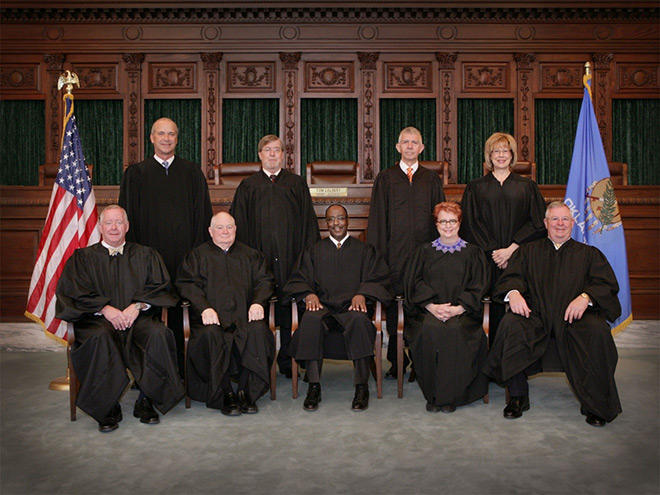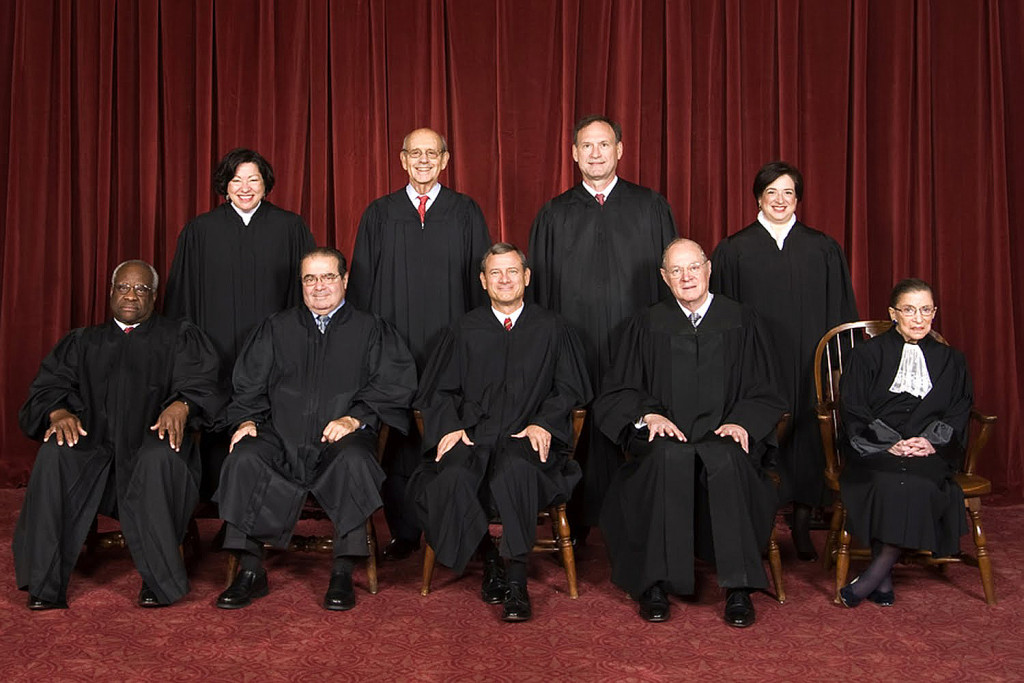Over the past couple of weeks there have been some judicial rulings which have caused quite a stir. Most of the cases that are gaining lots of attention in my neck of the woods have been from the U.S. Supreme Court. However, as of today, there is a decision here in Oklahoma that has a some members of our legislature discussing impeachment proceedings for SEVEN of our nine States Supreme Courts justices. I've picked a sampling of these cases for me to share my insights regarding the decision which was rendered.
Prescott v. Oklahoma Capitol Preservation Commission: (read opinion here)
In the decision issued today, the State Supreme Court ruled (7 to 2) that the placement of a Ten Commandments monument paid for by private funds and placed on the grounds of the Oklahoma State Capitol violates Article 2, Section 5 of the Oklahoma State Constitution which prohibits the direct or indirect use of public property for the benefit of sectarian religious purposes. State Attorney General Scott Pruitt has publicly decried the decision and has requested a rehearing focusing on his assertion that the Ten Commandments are a significant foundation of Western legal traditions.
While I hold great value for the Christian scriptures in general and the Ten Commandments specifically, I believe that the court rendered the appropriate decision. Yes Judeo-Christian ideologies are important within Western history, concepts such as "don't murder" and "don't steal" are not exclusive to the Judeo-Christian tradition. Legal codes in ancient Greece and Roman which predate the influence of Jewish and Christian influence in Europe share these ideas so Pruitt's historical context loses merit. When a larger display of monuments representing various legal codes of Western tradition is placed on the Capitol grounds, then the historical context argument may have merit. But as of now, these justices have made the appropriate ruling and there is no reason to suggest impeaching them for simply doing their job.
Arizona State Legislature v. Arizona Independent Redistricting Commission: (read opinion here)
By use of the initiative process (a procedure in various states through which the people themselves can propose and vote on laws external of the elected legislature), the people of Arizona, in an effort to limit partisan gerrymandering, removed from its state legislature the power to redraw the map of election districts based upon the decennial U.S. census and gave this power to a newly created state Redistricting Commission. The Arizona legislature sued claiming that this process denied them of a prescribed power found in Article 1, Section 2 of the U.S. Constitution: the power to conduct elections is given to the "legislature". The Supreme Court ruled (5 to 4) that the word "legislature" in this particular section of the Constitution referred to all legislative/lawmaking powers within a state, including the initiative process if allowed in a specific state, and thus the Redistricting Commission is constitutional.
I am not a fan of gerrymandering when it is accomplished for the purpose of giving one political party an unfair advantage over another; nor is this practice considered legal if it can be proven as the primary cause of redistricting efforts. Having said that, my initial reaction to this ruling was "what on earth?...'legislature' clearly means the elected representatives in a state!" So, while supportive of Arizona's efforts to limit gerrymandering I was aghast at the absurdity of the ruling...until I read it. That same Article/Section gives Congress the power to alter the criteria for election laws. Initiative and referendum (a procedure in which a legislature refers a proposed law to the people rather than to the governor) both became popular in the early 1900s. As states have added these procedures Congress began passing legislation to respect the changes these states made in their lawmaking practices. As of now, I support this decision.
King v. Burwell: (read opinion here)
The Affordable Care Act, commonly referred to as Obamacare, requested states to establish health care exchanges to help increase the quantity of people covered by a health insurance plan. ACA further authorized the federal government to create and oversee an exchange within a state which opted not to create its own exchange. Further, ACA offered tax credits to individuals/families whose income met certain requirements so as to help them afford the selected insurance plan. A lawsuit was filed contending that ACA only authorizes the tax credits in situations where a state established its own exchange and not within those states where the federal government created the exchange. The Supreme Court ruled (6 to 3) that the tax credits in state with the federally created exchange are legal. The heart of the ruling is premised on the idea that in many complex items of legislation the individual components are best understood within context of understanding the whole.
I do not like the Affordable Care Act. It is overly complex. It was rushed through Congress without thorough debate. Promises were made to both Senators and Representatives in order to get them vote for it which were then never fulfilled. I disagree with federal government requiring the purchase of a commodity simply based on living in this country (that is 100% different than the requirement to purchased car insurance because that is linked with a personal choice to drive a car). I disagree that the penalty for not having health insurance is now considered a tax; taxes should not be used as a penalizing method. Further, now that it has been declared a tax that makes the whole bill a revenue bill and since the revenue component did not originate in the House of Representatives and Article 1, Section 7 of the U.S. Constitution requires all revenue bills to originate in the House. There is simply a whole host of messy situations around the the entirety of the ACA. And yet, it is still currently law. Until such time as it is removed by legislative vote, overturned by the Supreme Court on some other legal argument yet to be raised, modified in some significant way, it is still the law. The ruling given in this case makes sense to me. While the wording of the tax credit passages did not specifically cite "federal exchanges", federal exchanges were authorized in other passages and understanding of the fullness of the ACA expresses an intent consistent in the offering of the tax credits for all exchanges period.
Obergefell v. Hodges: (read opinion here)
This decision (5 to 4) on the understanding of marriage is certainly making itself manifest through all forms of media attention. I'm sure my comments on a couple of the above cases have been enough to prompt angry villagers to threaten to burn down my home and/or run me out of town. Because this specific case is so complex, not only in the text of its ruling but also within the emotional stirrings that it makes within people on each side of the outcome, I will not provide my comments at this time in this forum...maybe another day.
All in all it's hard for me to clearly identify my personal approach to legal interpretation. There is an originalist/textualist/strict interpretation ideologue living within side of me. I want to base my legal insight on the words that were written within the mindset of the person that wrote them. Words have power; why did this person (or group of people) use this arrangement of these specific words? There was a purpose! At the same time, I truly recognize that there are a host of issues/ideas/technologies that have developed subsequent to the penning of those specific words that could never have been in the frame of reference of those who penned the words. I highly doubt that Ben Franklin and James Madison could have ever conceived of the idea that McDonalds and Holiday Inn could be construed as something so intrinsically linked with interstate commerce that they would envision the use of Civil Rights Act of 1964 as a means to help facilitate equity within interstate commerce/travel. Times change and even my strict interpretation gut knows I have to be loose/liberal enough to apply those original words into the most appropriate context for today. See...it really is a clash between the idealistic and the realistic sides within my core.


No comments:
Post a Comment